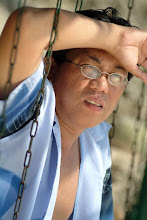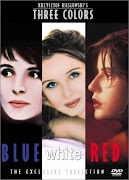 IF THERE'S ONE saving grace about American cities, it's the bounty of its public libraries.
IF THERE'S ONE saving grace about American cities, it's the bounty of its public libraries.Here in the Kansan city of Topeka, for instance, the amenities of the Topeka and Shawnee County Public Libary (featuring the convenience of malling with its luxuriant spaces and state-of-the-art architecture) abound not only with every bookworm's capacity to borrow as much reading fare as one can hoard but also the availability of DVDs to bring home. Oh, the wide-eyed buffet for the soul!
Here are the films I've long wished to see which recently got me--thanks to my insomnia--on a viewing binge:
 ETERNITY AND A DAY. I rank this Theo Angelopoulos masterpiece among the films I’m most intimate with, which I can watch in tireless rapture again and again, like the rest of my personal favorites: Wim Wender’s Wings of Desire, Akira Kurosawa’s Ikiru, Milos Forman’s Amadeus, Jane Campion’s The Piano, Patrice Leconte’s Man On The Train, Mike Figgis’ Leaving Las Vegas, Zhang Yimou’s Hero.
ETERNITY AND A DAY. I rank this Theo Angelopoulos masterpiece among the films I’m most intimate with, which I can watch in tireless rapture again and again, like the rest of my personal favorites: Wim Wender’s Wings of Desire, Akira Kurosawa’s Ikiru, Milos Forman’s Amadeus, Jane Campion’s The Piano, Patrice Leconte’s Man On The Train, Mike Figgis’ Leaving Las Vegas, Zhang Yimou’s Hero.Winner of the grand prize at the 1998 Cannes Film Festival, Eternity and A Day revolves around the last moments of a dying Greek writer who embarks on a dreamy voyage to relive an idyll with his long-dead wife at their seaside retreat. His reveries, detouring into the times of an ancient Greek poet who buys forgotten words to construct an epic, segues seamlessly into the travails of an eight-year old boy, a refugee whose future weaves into Alexander's own search for meaning and fulfillment into the past.
 THE COLOR OF PARADISE. Living up to its title is a miracle made palpable in the hands of Majid Majidi who made waves in world cinema with his enchanting Children of Heaven. In this lovely and lush tale—a testimony to the natural world’s majesty—Majidi explores a universe of the senses refracted from the perspective of a blind Iranian boy grappling with his father’s lost of innocence.
THE COLOR OF PARADISE. Living up to its title is a miracle made palpable in the hands of Majid Majidi who made waves in world cinema with his enchanting Children of Heaven. In this lovely and lush tale—a testimony to the natural world’s majesty—Majidi explores a universe of the senses refracted from the perspective of a blind Iranian boy grappling with his father’s lost of innocence.Aside from its heightened evocation of textures out of the boy's world, pure bliss are the painterly simplicity and spectacle of the countryside and its unerring natural rhythm: little hands intuiting through a garden, the burbling of the brook, the dialogue of woodpeckers, the orchestra of birdsongs and insects and the breeze. Best Film winner at the 21st Montreal Film Festival, among others.
 NIGHTS OF CABIRIA. Chaplinesque with her panache for hilarity and heartbreak, Giulietta Masina won Best Actress at Cannes as the title character in one of Federico Fellini's most haunting films, a valentine for a prostitute’s child-like but stubborn search for faith, love, and a hopeful place under the red light.
NIGHTS OF CABIRIA. Chaplinesque with her panache for hilarity and heartbreak, Giulietta Masina won Best Actress at Cannes as the title character in one of Federico Fellini's most haunting films, a valentine for a prostitute’s child-like but stubborn search for faith, love, and a hopeful place under the red light.Winner of the Academy Awards for Best Foreign Film, this stirring cinematic piece comes in the heels of Fellini’s international breakthrough with La Strada (another collaboration with leading lady/wife Giulietta Masina). Rambling and leisurely paced, Nights of Cabiria is suffused with sunlight despite its dark undertones. Whatever they say of the human spirit, Masina’s Cabiria walks the talk in that tough but tender unraveling at the film’s fireworks-worthy end.
 THE EEL. A psychodrama of regret, sexual repression as well as healing, Shohei Imamura’s film is engaging as he deftly tracks the journey of an anti-hero—a cuckold who murdered his wife he caught in an illicit act—en route to redemption.
THE EEL. A psychodrama of regret, sexual repression as well as healing, Shohei Imamura’s film is engaging as he deftly tracks the journey of an anti-hero—a cuckold who murdered his wife he caught in an illicit act—en route to redemption.From the violence of its opening act to the comic but poignant interlude of an impending relationship between two troubled people, Imamura’s vision gracefully weaves a spell of surreal vignettes—a neighbor who expects visitors from outer space, a mother who fancies herself a ballroom diva, etc—into a catharsis that charms and earns its insistence to keep the human spirit above the stormy depths of the heart. Winner of the grand prize at the Cannes Film Festival.
 THE SEVENTH SEAL. No film buff worth his larger-than-life craving for the classic can miss Ingmar Bergman's 1956 film that has survived its fair share of parodies for the heft and unabashed exploration of its subject matter: man’s search for God in the face of cynicism and destruction.
THE SEVENTH SEAL. No film buff worth his larger-than-life craving for the classic can miss Ingmar Bergman's 1956 film that has survived its fair share of parodies for the heft and unabashed exploration of its subject matter: man’s search for God in the face of cynicism and destruction.Wearing its lyrical and allegorical conceit on its sleeve, Bergman zooms in on the anguish of a knight returning from the Crusades and facing an apocalyptic scenario straight from the Book of Genesis. He plays chess with Death, to begin with. He encounters a troupe of actors and a flock of flagellants as he casts a shadow of his long face through the film’s somber tone and its philosophical perorations.
Through it all, brave-hearted is Bergman’s homage to the power of imagery that abounds here on top of the miracle of humor sprinkled through an otherwise stark visual meditation. Delicious is that scene where a philandering performer, outsmarting the cuckold who wanted to kill him and climbing a tree to avoid the beasts in the forest, looked down at Death literally sawing off the trunk of his perch!
 THE SWEET HEREAFTER. The heart of another is a dark forest, Conrad once wrote. So concurs Atom Egoyan as he adapts for the screen Russell Bank’s celebrated novel about a tragedy in a small town and how the parents’ process of healing dovetails into a man’s search for truth and wholeness, both as a lawyer and as a father.
THE SWEET HEREAFTER. The heart of another is a dark forest, Conrad once wrote. So concurs Atom Egoyan as he adapts for the screen Russell Bank’s celebrated novel about a tragedy in a small town and how the parents’ process of healing dovetails into a man’s search for truth and wholeness, both as a lawyer and as a father.With its cocktail of themes (treachery, loss, and transcendence), Egoyan unerringly eschews cliché and cheap emotions as he constructs the tectonic shifts of the narrative like a puzzle, like layers of ice in the film’s arctic landscape. Or metaphoric reverb in the Pied Piper story which Egoyan used as a subtext in the story. Deeper secrets are revealed, no less devastating than the circumstances of the accident even as the lawyer dredges up odds and ends of his troubled past. How to pick up the pieces of broken lives? Egoyan is emphatic with the restraint of his clarifications no less complex than prisms, which also informs the luminous portrayal from an ensemble lead by Ian Holm and Sarah Polley.
 THE DREAMLIFE OF ANGELS. What has otherworldly bliss got to do with the mundane lives and loves of two women—a drifter who opens her rucksack along with her heart to strangers and a searcher who wears her suspicions on her sleeve?
THE DREAMLIFE OF ANGELS. What has otherworldly bliss got to do with the mundane lives and loves of two women—a drifter who opens her rucksack along with her heart to strangers and a searcher who wears her suspicions on her sleeve?The debut film of Erick Zonca offers a quilt from shreds of desire to be alive, rendered stark with the peripheral reality of a comatose girl in whose home both Isa (Elodie Bouchez) and Marie (Natasha Régnier) stakes a sense of refuge after forging an unlikely friendship in a sewing factory.
While tragedy rips the seams of their shared intimacy in the end, the film celebrates the brief history of soul mates as well as the tenacity of possibilities for miracles, no matter if woven like a patchwork, out of the most fragile of human relationships. Such is the stuff of epiphanies, as delicate as the finely textured performances of Bouchez and Régnier who shared the prize for Best Actress at the 1998 Cannes Film Festival.
 BELLE DE JOUR. Regarding filmmaker Luis Bunuel, the critic Roger Ebert probes: “He was deeply cynical about human nature, but with amusement, not scorn. He was fascinated by the way in which deep emotional programming may be more important than free will in leading us to our decisions. Many of his films involve situations in which the characters seem free to act, but are not.”
BELLE DE JOUR. Regarding filmmaker Luis Bunuel, the critic Roger Ebert probes: “He was deeply cynical about human nature, but with amusement, not scorn. He was fascinated by the way in which deep emotional programming may be more important than free will in leading us to our decisions. Many of his films involve situations in which the characters seem free to act, but are not.”One of the few films about eroticism that really gets it down pat--It’s more in the mind, not in the genitals, stupid!—Belle de Jour stars the incandescent Catherine Deneuve as Severine, a woman whose life is at once picture-perfect and empty. Leading a double life (a prostitute by day and a doctor’s housewife by night), Severine revels in repressed desire to be humiliated and used sexually. She escapes into waking dreams where she enjoys being whipped, soiled with mud, and bound to trees. Not recommended for feminists, definitely.
(Next in my viewing list: The Rose Tattoo, Sweetie, La Dolce Vita, Mamma Roma, The Circle, and The Magdalene Sisters)

























































3 comments:
Thanks very much for this. Now I know I need to get back to watching good movies. No more sappy romantic comedies.
Thank you sir!
You're very welcome, witness! THnaks for visiting. :)
i saw the seventh seal in dgte. didnt even know it was a must watch because i just found it in one of our neighbors shelves along with casablanca and some chaplins. hehe. i found it amazingly weird at that time. color of paradise,is something else. the sweet hereafter for me is an egoyan classic. read the book too. and of course, it's the movie that made sarah polley an indie fave. happy watching mike. i dooooo envyyyyyyyyy you.
Post a Comment